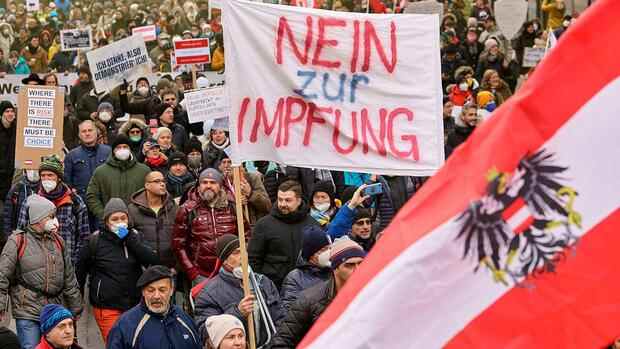Vienna Officially, the lockdown that has existed in Austria since November 22nd will end on Sunday night. Those who have been vaccinated and those who have recovered can then move more freely again; For unvaccinated people, on the other hand, exit restrictions still apply, especially in order to induce as many of them as possible to have the corona vaccination.
Otherwise the country will resemble a patchwork quilt, because different rules will apply in the federal states. “The federal government has a sharp bottom edge,” said Health Minister Wolfgang Mückstein about the government’s strategy.
Hotels, restaurants and theaters are generally allowed to open, but there will be restrictions such as the 2G rule. After that, the immunization must be proven. In addition, it is mandatory to wear an FFP-2 mask indoors. Bars and après-ski bars will remain closed. In the federal states of Tyrol, Burgenland and Vorarlberg, the requirements of the federal government apply.
The capital Vienna, among others, is taking its own path. The shops there will also be allowed to open next week, but hoteliers and restaurateurs will have to wait until December 20th.
Top jobs of the day
Find the best jobs now and
be notified by email.
This different approach is likely to confuse some residents of the country, especially since it does not necessarily reflect the pandemic situation. In the western state of Vorarlberg, the seven-day incidence is 960, in Vienna it is 327 – despite this, a stricter regime will prevail in the capital. In addition, there is an unequal treatment of restaurants and hotels by region, which industry representatives are upset about.
The lockdown worked in Austria, but not as strongly as politicians and business representatives had hoped. “The virus gives us a respite,” said Chancellor Karl Nehammer. “There is a downward trend in infections, but not yet a solidified trend.”
The number of patients in intensive care units remains high
Even before the exit restrictions came into force, the number of infections reported daily had reached 16,500, the highest level of this fourth wave of pandemics. On Wednesday it was 5600. On the other hand, there was no decrease in the number of intensive care patients. At least it seems to be stagnating.
Before the government announced the next steps on Wednesday, business representatives and politicians had lobbied for their concerns. So the usual game took place that has been known since the beginning of the pandemic. Harald Mahrer, head of the Chamber of Commerce (employer), called for “everything to be opened up”. Tyrol’s Governor Günther Platter made the same claim. The uncertainty weighed particularly heavily on winter tourism, which is very important in Tyrol.
In the economy the nerves are on edge. Especially the already battered retail trade has been hit hard by the renewed exit restrictions. In the past two and a half weeks, many shops have made use of the online channel. “Click & Collect”, ordering and picking up, was the sales strategy born out of necessity.
However, it works differently depending on the sector: large bookstores are more likely to get along with it, while the clothing and textile retailers find it more difficult. The late autumn has been very cold so far, and such weather conditions usually boost the winter clothing business.
Retail is lamenting massive losses
This winter, stores were only able to benefit to a limited extent from this effect. “The lockdown is a stab in the heart of the retail trade,” says Stephan Mayer-Heinisch, President of the Austrian Trade Association, probably also with the pathos of the lobbyist. “We’ll see the long-term consequences.”
Restaurateurs reacted with surprisingly calm to the announcement of the lockdown. The high number of infections already prevented guests from visiting a restaurant in November. Many an innkeeper has therefore said to himself: Better to close down and take advantage of state aid than to starve on business.
During the lockdown, some restaurants switched to pick-up, others left that too. The delivery services demand a high proportion of turnover from every order, so that “take away” is not worthwhile for many hosts. At the same time, the turnover of a restaurant has to fall by a certain amount in order for the state to compensate it.
The tourism sector has been waiting particularly eagerly for the government’s declaration. The winter season 2020/21 was almost completely canceled, the number of overnight stays shrunk to around five million. In the last year before the pandemic, travelers in Austria had booked 73 million overnight stays from November to April.
Germany has classified Austria as a high risk area
If last year’s scenario repeats itself, many hotels are likely to run into financial difficulties. At least in part, the winter season seems to have been saved. The hotel industry is currently struggling with a labor shortage, which has worsened compared to the previous year. The uncertain prospect of whether the season will start at all has deterred many foreign seasonal workers from signing an employment contract in Austria.
Another uncertainty hovers over Austria’s tourism. Germany continues to classify the neighboring country as a high-risk area. This means that unvaccinated children under the age of twelve who return from Austria have to be quarantined.
A family vacation is therefore still difficult. How it continues depends on the government in Berlin. “Therefore we cannot currently say whether anything will change before the Christmas holidays,” says Michael Strasser from the Ministry of Tourism.
More: Biontech and Pfizer expect Omikron to be less effective – Drosten: “Doesn’t look good for people who have been vaccinated twice”
